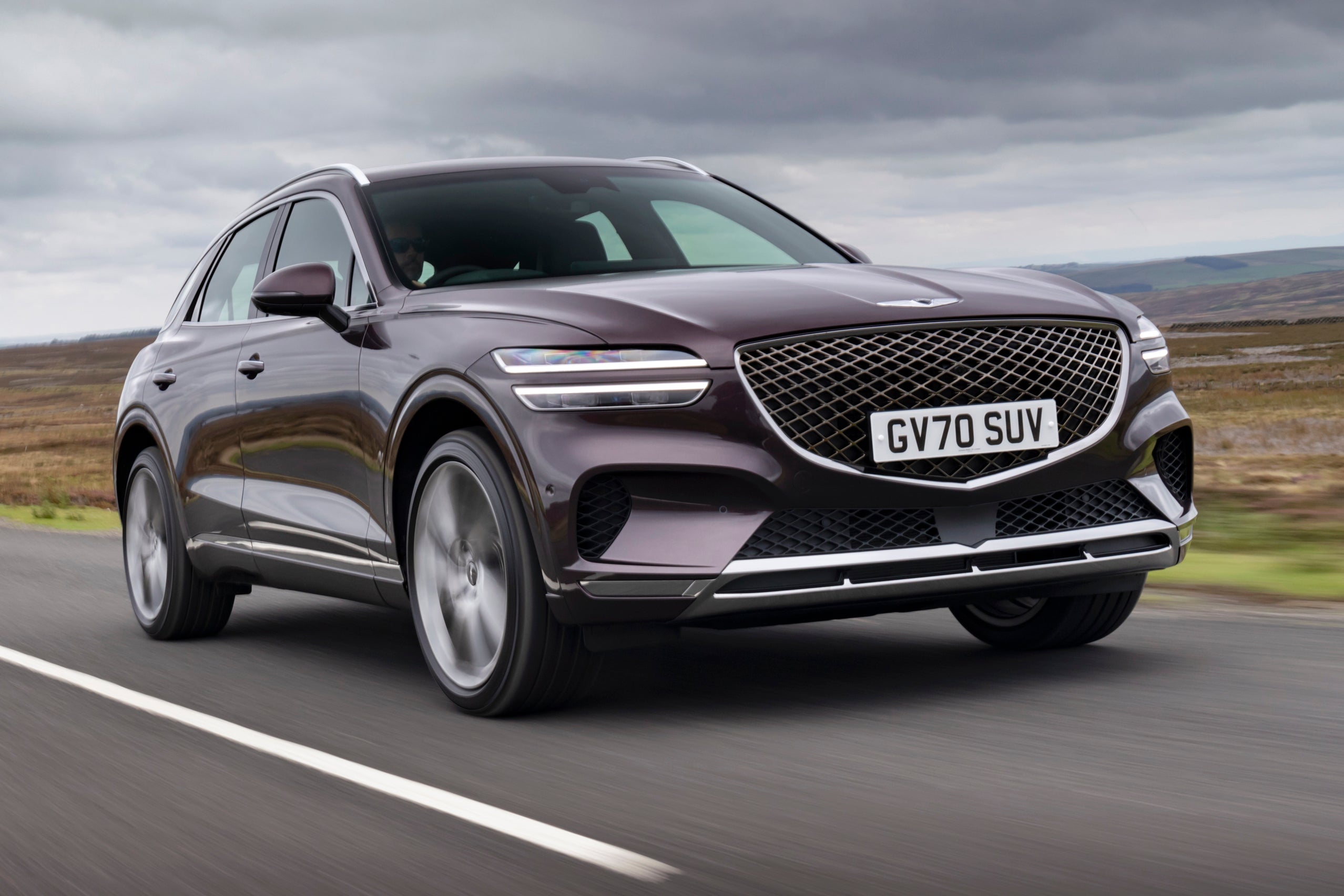Genesis GV70 Review 2025: Price, specs & boot space
Written by Ivan Aistrop
Quick overview
Pros
- Great value for money next to rivals
- Loads of standard equipment and clever tech
- Sensational five-year aftercare package
Cons
- Rivals are slightly more polished
- Can’t match best-in-class for practicality
- Combustion engines are very thirsty
Verdict: Is the Genesis GV70 a good car?
"In the premium SUV market dominated by Audi, BMW and Mercedes-Benz, the Genesis GV70 tries to stand out with flamboyant design, strong value for money, impressive technology and a peerless ownership experience. The car is convincing in other ways, too, because it’s decent to drive, good on quality and reasonably practical."
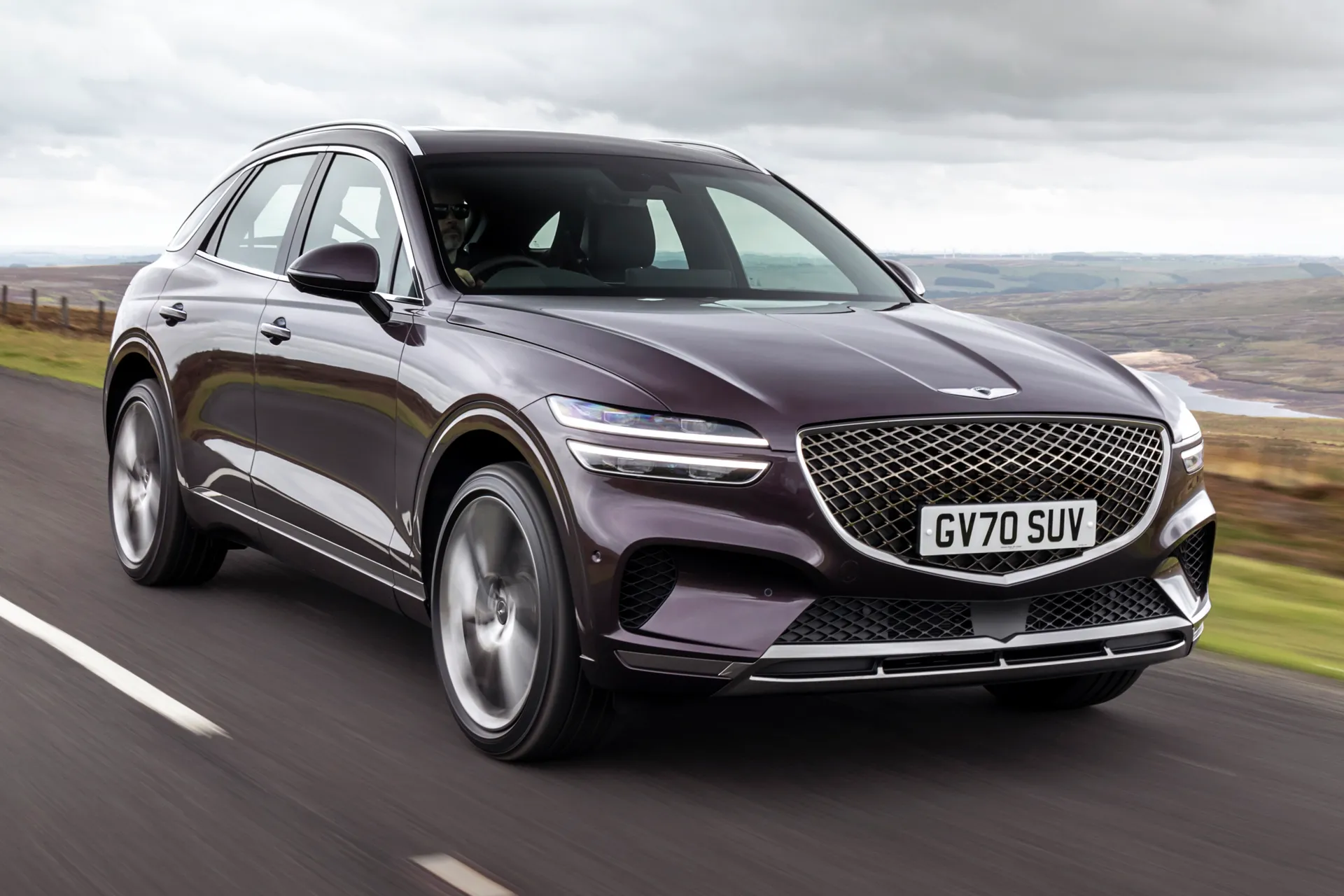
Benjamin Franklin said that the only certain things in life are death and taxes, but we’d like to offer another one into the mix, and it’s this: anyone wanting to buy a premium mid-size SUV will consider an Audi, BMW or Mercedes.
Such is the German companies’ stranglehold on this popular and ever-growing section of the market that barely anyone else ever gets a look-in. Rivals such as the Alfa Romeo Stelvio, the Volvo XC60 and the Lexus NX are all appealing cars in their own ways, but their sales numbers pale into insignificance when compared with those of the German firms.
So if you’re Genesis, a relatively unknown Korean brand that’s essentially the luxury wing of Hyundai (think of what Lexus is to Toyota), and you’re trying to market the GV70 SUV in a market that also contains the Audi Q5, BMW X3 and Mercedes GLC, how do you get any traction, let alone compete in the face of such utter dominance?
Key to that aim is standing out, and Genesis attempts to do that in a number of ways. Firstly, with its styling: the firm’s cars look flamboyant enough and different enough to catch the eye at the kerbside, but not so out-there that would-be customers would run a mile.
Secondly, there’s value for money. As a premium brand, Genesis’s cars don’t come cheap by any stretch of the imagination, but the money you pay is often thousands less than you would for one of the German stalwarts. In return, that money gets you much more in the way of standard equipment, clever technology and, more often than not, power.
Probably Genesis’s biggest differentiator, though, is customer care. As soon as you express an interest in the brand online, you’re assigned your own Genesis personal assistant who will talk you through the options, help you specify your car, deal with the transaction, and even deliver the car to you personally. And once you own the car, you’re also treated to an incredible five-year aftercare plan, where that very same person will collect your car for routine servicing, and deliver it back to you once the work is done, while a courtesy car is left with you in the interim. The cost of all servicing work is included in the five-year plan as well, as is a five-year, unlimited-mileage warranty and five years of roadside assistance. As ownership experiences go, they don’t come much more fuss-free than this.
Of course, all of this would count for absolutely nothing if the cars themselves were rubbish, but there’s good news on that score, too, because they’re very convincing in a number of ways. Take the Genesis GV70 as an example. It’s pleasant to look at, pleasant to sit in thanks to all-round quality, attractive design, comfortable seats and lots of luxury features, and it’s pleasant to drive thanks to a fairly comfortable ride and decent refinement.
Ok, the Genesis GV70 isn’t quite as polished on the road or in terms of uniform interior plushness as its all-conquering German rivals, but it’s certainly close enough to be convincing. Likewise, it can’t quite match the best-in-class for practicality or versatility, but it’s not that far behind, and more than good enough for most buyers that may be taken with the car’s other attributes.
Will the Genesis GV70 be rewriting the sales charts anytime soon? Probably not. However, it does offer a convincing and reasonably compelling alternative to prestige SUV buyers looking for something a little different, an easy life included.
Looking for the electric version? You'll need our Genesis Electrified GV70 Review.
Is the Genesis GV70 right for you?
If you’re the sort of person who likes to do things their own way and avoid the obvious choices, then the Genesis GV70 might well fit your bill. It’s unlike anything else in the class, and to some people that level of uniqueness and individuality will be appealing in itself.
The GV70 will also suit you if you don’t necessarily care about having the best car of its type, and just want to buy something without worrying about it for the next few years. Genesis’s brilliant five-year aftercare package basically takes care of everything for you via your own dedicated Genesis personal assistant, so this really is as hassle-free as car ownership gets.
What’s the best Genesis GV70 model/engine to choose?
That depends entirely on what sort of driving you plan to do. If you plan to tear about the place as fast as you possibly can, then the 304PS petrol model is the way to go thanks to its strong performance and appealing soundtrack. If you’re in for a lot of long motorway schleps, however, you’ll probably be better off with the more relaxed, long-legged attitude of the diesel model. Aside from anything else, it doesn’t have quite the same voracious thirst as the petrol, so you won’t be stopping for fuel as often, or paying quite so handsomely for it.
In truth, if you want the best all-round version of the Genesis GV70, you’ll want the all-electric version – the Electrified GV70 – due to its strong performance, improved refinement and more polished road manners.
In terms of the best trim level on offer, there’s not much missing from the standard Premium trim, which still comes with a whole host of luxury goodies, so we’d stick with that. The more expensive Sport and Luxury trims don’t give you a whole heap more kit, but they do give you access to a variety of optional extras that you can’t specify on the base trim, so if you plan to go nuts with the options list, you’ll be wanting one of those.
What other cars are similar to the Genesis GV70?
As a premium mid-size SUV, the Genesis GV70 isn’t short of rivals. The main ones come from the ‘big three’ German companies in the form of the Audi Q5, BMW X3 and Mercedes GLC. The Audi will suit those looking for an athletic-feeling car to drive, the Mercedes will suit someone looking for a more relaxed, comfortable, laid-back approach, while the BMW will suit someone looking for a blend of both.
The GV70, meanwhile, is most like the Merc in its attitude. Other pretenders in the class include the Scandi-cool Volvo XC60, and the flamboyant Alfa Romeo Stelvio.
Comfort and design: Genesis GV70 interior
"Unconventional interior design is appealing, and there's lots of impressive tech in the Genesis GV70. Quality is largely impressive, too, but it doesn’t quite have the uniform plushness of a German rival. It can’t quite match the best for practicality, either."
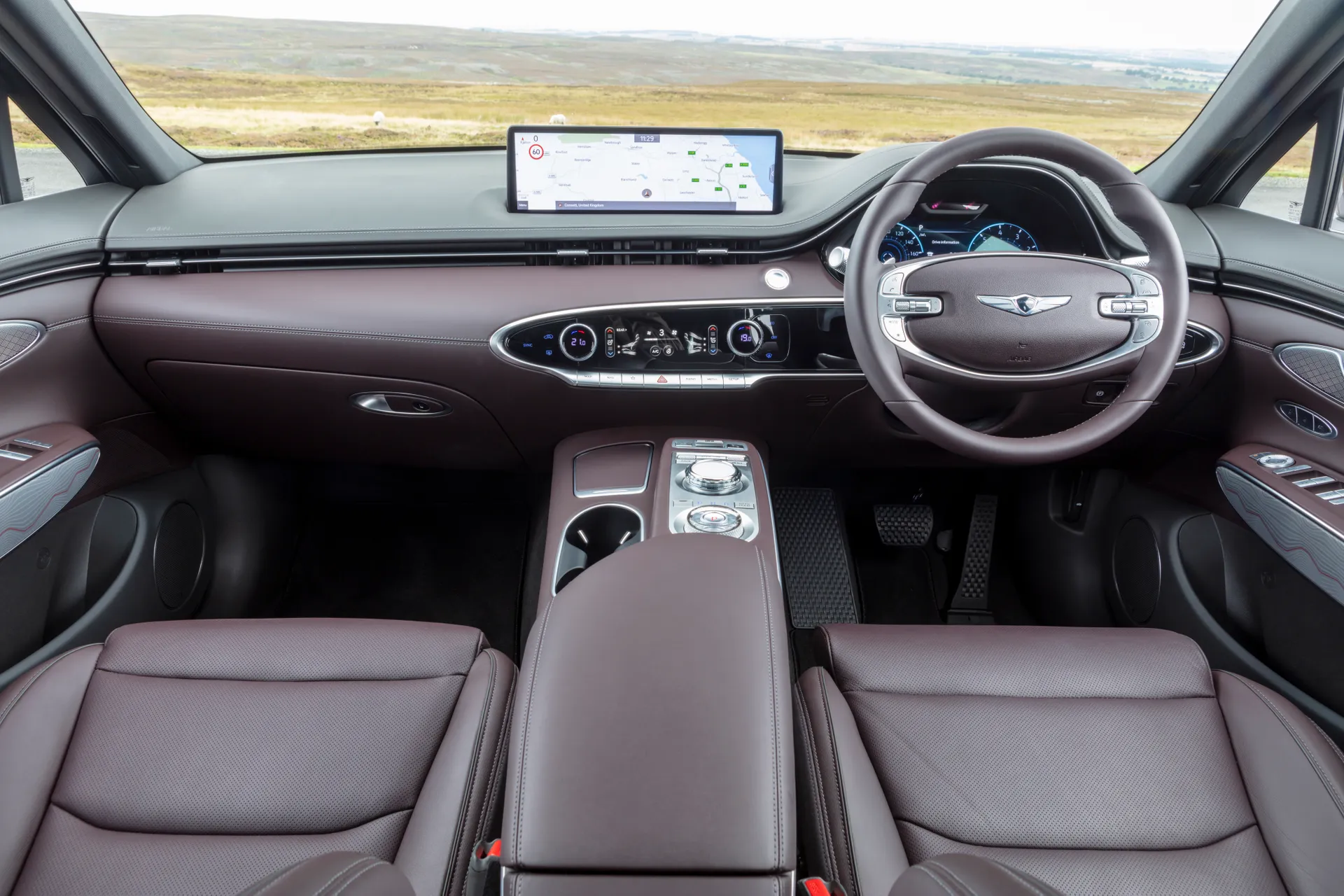
The dashboard’s design uses a variety of circular and oval motifs that give it an unusual but attractive appearance. For many, that level of individuality will be appealing next to the conventional designs found in many rivals.
The front seats are tremendously supportive, and there’s full electric adjustment included as standard on all models, along with electric steering adjustment. There’s a huge range of movement provided all round, too, so pretty much anyone should be able to find a driving position to suit them, whether they prefer a sporty low-slung position or a more commanding, perched-up one.
Once you’ve found your ideal position, the Genesis GV70 has more tricks up its sleeve. There’s a fingerprint reader that effectively authenticates who’s driving, and successful authentication not only lets you start the car, it applies that driver’s preselected settings and preferences for things like driving position and radio station. Slightly gimmicky, perhaps, but still quite useful.
Visibility is good all around the car, with slim pillars either side of the windscreen, and windows built into the rear pillars to improve the view. Rear parking sensors and a reversing camera are standard, but if you want front sensors and a 360-degree camera system, you’ll have to add the expensive Innovation Pack as an option. More on that later.
Quality and finish
Overall, the Genesis GV70’s interior looks impressively glitzy. All the surfaces directly in your eye line look and feel expensive, and all the major touchpoints have pleasant, tactile finishes. There’s a tasteful and thoughtful mix of colours and trims on show, making the cabin look interesting as well as classy. Go for one of the higher-end trims and you get more choice over your interior colour scheme, and you can also choose from a variety of optional interior upgrades, such as quilted leather upholstery and suede headlining.
As impressive as the cabin looks overall, there are just one or two places where the quality drops slightly. For instance, the door pulls are made from silver plastic, where they’d be genuine metal in an Audi or BMW, and many of the dial controllers don’t turn and click with quite the same amount of substantial and precise feel. The window switches also feel a little bit lightweight. It’s nothing that ruins the effect, it’s just that the feeling of quality is a bit more uniform and consistent in rivals.
Infotainment: Touchscreen, USB, sat-nav and stereo in the Genesis GV70
All versions of the GV70 get the same 14.5-inch infotainment screen mounted high up in the middle of the dashboard, and while it controls most of the car’s functions, it also supports most of the infotainment functionality you expect, such as navigation, DAB, Bluetooth, voice recognition, Apple CarPlay and Android Auto.
The screen’s positioning on the dashboard means you have to lean forward a little bit to use the touchscreen functionality, making it feel like a bit of a stretch, but like in a BMW, there’s a rotary dial down on the console that you can use to control the system instead. The system is fairly easy to find your way around with reasonably logical menus and handy shortcut buttons, and the graphics look clear and sharp, too. Mercifully, you don’t have to delve deep within the system to control the aircon, as this has its own control panel lower down on the dashboard, although the touch-sensitive elements of that are a bit of a faff to use in their own right.
The standard driving instruments are a mixture of conventional dials and an 8.0-inch digital readout, and it all works well. If you add the optional Innovation Pack, the standard instrumentation is replaced by a 12.3-inch digital driver display. It’s very expensive (over £4,000) but adds a variety of extra infotainment functionality and an expanded suite of driver aids. However, while it looks good, it ultimately doesn’t work any better than the standard system, although you do get a handy head-up display as part of the pack as well, and a wireless phone charger, too.
All versions have two USB ports in the front, and two in the back, while on Sport and Luxury trims, you can upgrade your sound system to the more powerful Lexicon audio setup for a very reasonable price.
Space and practicality: Genesis GV70 boot space
The front seats of the Genesis GV70 are surrounded by plenty of space, and adults slipping themselves into the rear seats will also find that they have enough headroom and legroom to make themselves comfortable. That said, many prestige SUV rivals are a little roomier still, and cater better for passengers who are longer of limb.
The above statement of comfort assumes that there are no more than two occupants in the back of the car; try and squeeze in a third, and whoever is in the middle will sit on a seat that’s harder, higher and narrower than those on either side. There’s also a large hump in the floor in front of that middle seat, which limits foot space.
It’s a similar story on boot space. The 542 litres of space you get is reasonable, and should be enough for the purposes of most owners in most situations, but in terms of outright capacity, many rivals do a bit better. The boot isn’t a great shape, either – the space is quite shallow, and the rear wheel arches encroach into your load space. However, there’s barely any load lip to get in the way when you’re lugging in heavy items.
When you need maximum load-carrying capacity, you can drop the rear seats to open up 1,678 litres of space. This happens in a 60/40 split rather than the more versatile 40/20/40 arrangement found in some rivals. However, at least the rear backrests lie flat and level, leaving you a flush extended load bay.
Handling and ride quality: What's the Genesis GV70 like to drive?
"The Genesis GV70 is thoroughly capable when judged in isolation, and comfortable enough and wieldy enough for most buyers. However, several rivals in the prestige SUV sector have an appreciable amount more dynamic polish."
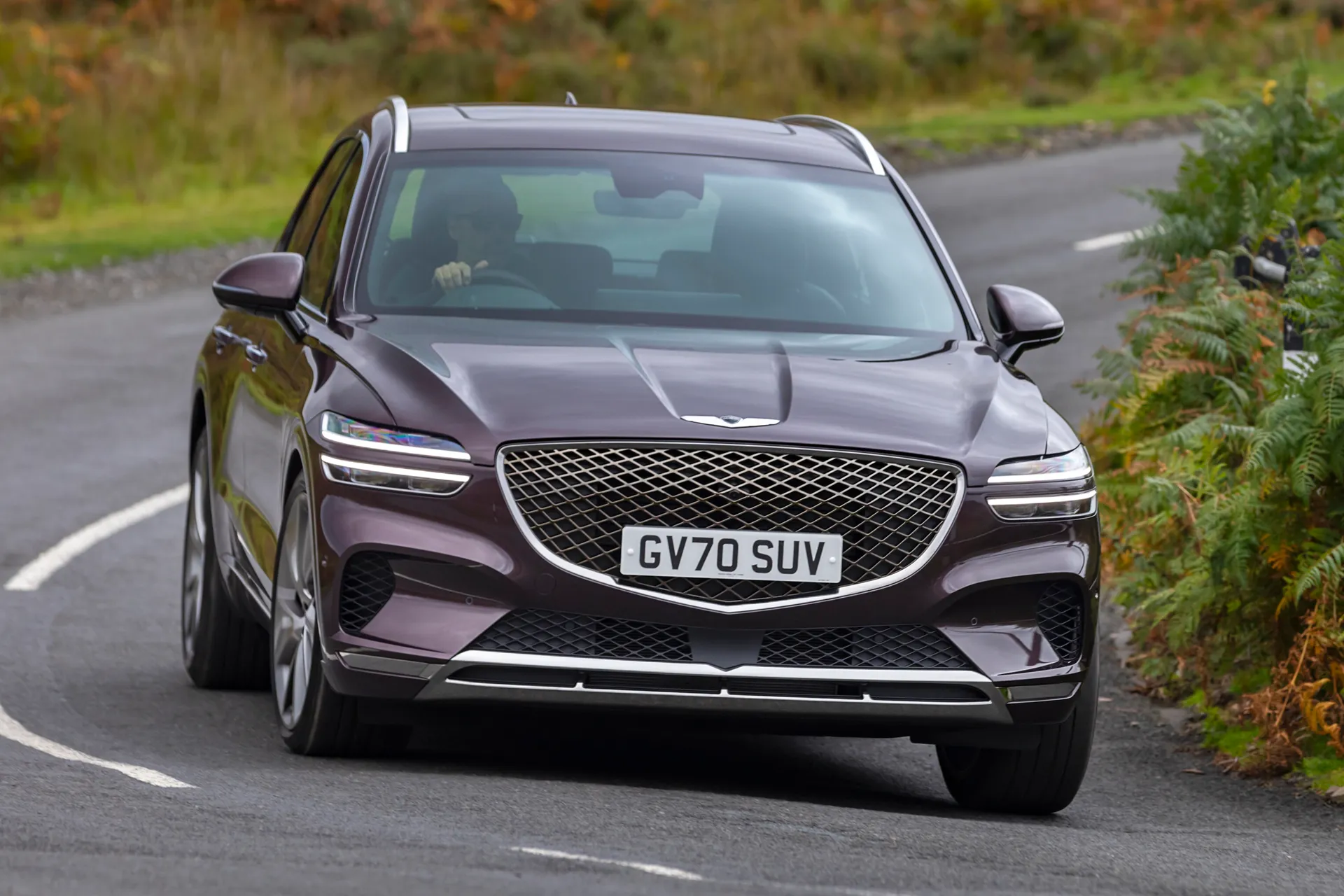
The GV70’s behaviour in this area is pretty convincing, and when judged in isolation, it should be capable enough to keep most drivers happy. However, it’s also true that the car doesn’t quite have the dynamic polish displayed by most rivals in the premium SUV sector.
Like some luxury limousines, the GV70 has a fancy suspension that uses a camera to ‘read’ the road in front of you and automatically adjust the adaptive damper settings according to what manner of road surface lies ahead. The thing is, whatever electronic wizardry is occurring behind the scenes, the GV70’s suspension always has a feeling of underlying softness.
There are some types of bump that are absorbed very effectively by the suspension, keeping things nice and comfortable. Over some other kinds of bump, however, and on undulating roads, you feel a bit too much vertical pitch and bounce, which harms comfort levels.
We’d strongly advise going for a car on the smaller 19-inch wheels as these are appreciably more comfortable than versions on 21s; the bigger wheels add a brittle quality to the ride, and it never quite settles down.
That softness can also make the body feel slightly wallowy and uncontrolled when changing direction, so it doesn’t feel quite as crisp in the corners as German rivals. There’s still a bit of fun to be had, though, because there's masses of grip and traction from the standard four-wheel drive, and the steering is weighty and precise.
What engines and gearboxes are available in the Genesis GV70?
Ignoring the all-electric version for a moment, you can have your GV70 with one of two combustion engines. The entry-level choice is a 2.2-litre four-cylinder turbodiesel with 201PS. Above that sits the 2.5-litre turbo petrol, which knocks out an altogether more serious 304PS. In both versions, all four wheels are driven through an eight-speed automatic transmission.
Even the diesel version isn’t slow, with 0-62mph taking 7.6 seconds and a theoretical top speed of 133mph. Regardless of the numbers, the engine’s strong low-down urge, combined with the smooth and efficient operation of the gearbox, always means the car feels responsive and ready to go when called upon. You'll move around in an effortless and easy way most of the time, but when you need it, strong acceleration is just a flex of your left ankle away.
The petrol is a rather different beast, and our use of the word ‘beast’ is no accident. Don’t get us wrong, it can still be docile and easy to modulate when you’re just pootling around, but it feels keener than the diesel to serve up its prodigious power, and when you give in to temptation and bury the throttle pedal it delivers properly thumping acceleration.
A 0-62mph sprint time of 6.1 seconds pays testament to that, and while it’s largely irrelevant unless you have your own personal aeroplane runway, stat fans might be interested to know that the top speed is 149mph.
Refinement and noise levels
The all-electric version of the GV70 is an exceptionally refined car in most circumstances, but here, we’re talking about the combustion-engined versions. These don’t do quite as dazzling a job, but they certainly don’t disgrace themselves.
The diesel engine is quiet enough, although it’s neither as quiet nor as smooth as the best diesel engines you’ll find in the German rivals. The petrol unit, meanwhile, is a smoother, more subdued companion when you’re just pottering along, and when you open it up a bit, it actually starts to sound pretty tasty.
Wind and road noise in both variants are adequately isolated on the motorway, so high-speed, long-distance journeys are fuss-free undertakings. However, there are other prestige SUVs that do a slightly better job of protecting your eardrums from the intrusion of the outside world.
Safety equipment: How safe is the Genesis GV70?
The Genesis GV70 was tested by the safety experts at Euro NCAP in 2021, and while it posted marginally worse scores in most areas than Genesis’s other models, it still managed to achieve the full five-star rating.
Standard safety equipment is the same regardless of which of the three trim levels you choose, and includes eight airbags, adaptive cruise control (with stop and start function in traffic), blind-spot collision assist, lane-keeping assist, automatic emergency braking (that detects pedestrians and bikes as well as other cars), intelligent speed limit assist and front cross-traffic alert.
The optional £4,000 Innovation Pack is available on all trim levels, and includes a variety of infotainment upgrades and extra driver aids. This adds forward collision avoidance, remote smart parking assist, highway driving assist, a 360-degree camera, blind-spot monitoring and a heads-up display.
MPG fuel costs: What does the Genesis GV70 cost to run?
"The Genesis GV70 is not cheap to buy, but looks like really great value for money next to rivals from other premium manufacturers, especially when you consider the sensational five-year aftercare package. Just remember to shut your eyes and whistle when you’re filling it up, because fuel bills will be horrendous."
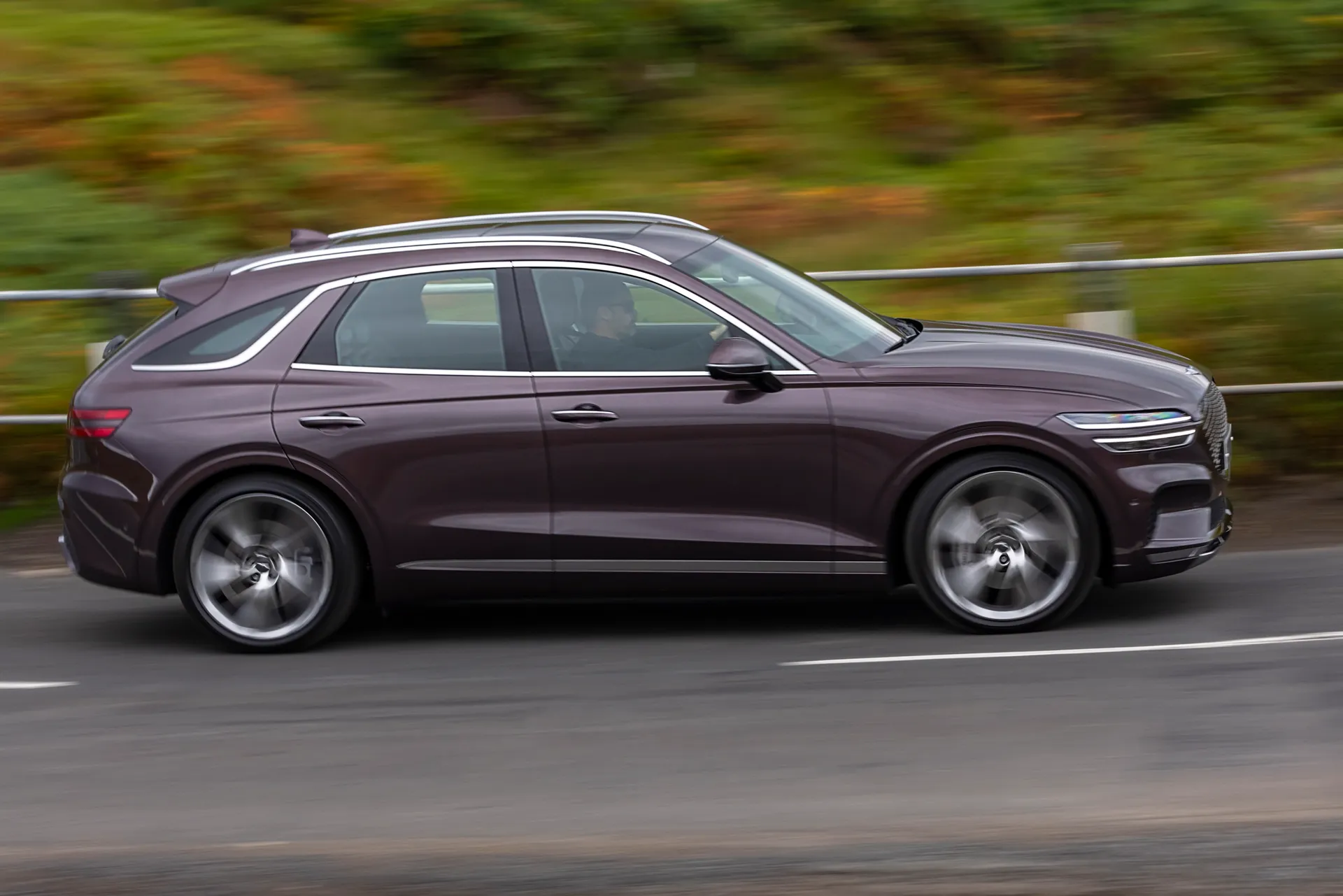
Genesis is a premium brand, and its cars don’t come cheap as a result, but that doesn’t stop the Korean company attempting to deliver big on value-for-money. Look at what you’ll pay for a GV70, and it’ll be thousands less than one of the German rivals, which will usually have a fraction of the power output.
What’s more, Genesis says a big part of the brand’s appeal lies in its excellent aftercare package. You get a five-year, unlimited-mileage warranty, five years of servicing with your car will be collected from you before the work and delivered back to you afterwards (with a courtesy car provided), five years of breakdown cover, and five years of free over-the-air software updates for your car’s various systems. That not only means you don’t have to worry about a thing for half a decade, but it will also save you a few quid in routine maintenance costs.
Where running costs will sting a bit more, however, is on fuel consumption. The petrol, in particular, is eye-wateringly thirsty, with a maximum average return of just 29.7mpg according to official figures, and if you use the engine’s full performance potential, you’ll be down to the low teens before you can say ‘Just Stop Oil’. The diesel does a little better, with a maximum average return of 39.0mpg, but that’s still considerably more thirsty than most rivals.
The correspondingly high CO2 emissions also mean this probably isn’t a car you’ll want to consider if you’re a company car driver. Unless you fancy the electric version, that is, which thanks to its zero-emissions status, will be incredibly cheap to run for fleet drivers
Genesis GV70 reliability and warranty
Not only is the GV70 a relatively new car to the UK, Genesis itself is a relatively new brand to the UK. That means that reliability data on the firm’s cars is rather sparse, and the brand hasn’t yet had the chance to feature in the HonestJohn.co.uk Satisfaction Index.
However, as Genesis is essentially the luxury arm of the Hyundai company, it’s good news that that brand came a strong 10th out of 33 manufacturers considered in our league table of owner satisfaction, with several impressive performances from various models on reliability. The incredible warranty and aftercare package should also help make Genesis ownership a painless experience.
Genesis GV70 insurance groups and costs
Depending on which trim level you choose, your diesel-powered GV70 will sit in either group 40 or 41 for insurance. Since the cheapest group is group 1 and the most expensive is group 50, you can probably predict that premiums won’t be cheap. Critically, this also makes it look expensive to insure against rivals like the Audi Q5, where an equivalently powered diesel car can sit as low as group 27.
The more powerful petrol, meanwhile, sits in group 44 regardless of trim level, so insurance costs will be even steeper, but this grouping is far more in line with those of equivalently powered petrol rivals.
VED car tax: What is the annual road tax on a Genesis GV70?
As of April 2025, new laws mean that not even the electrified GV70 is safe from the tax man. New electric cars are subject to the standard tax rate, the premium car tax fee and first-year showroom tax.
The 2.2D car can straddle to tax bands: band k (cars built from 11 Aug 2023 onwards) and band J (24 June 2022 to 10 Aug 2023). The former (newer) emits 1g/km more than the latter, meaning first-year tax costs £1,650 versus £1,095.
Buying the petrol means paying more tax. These emit 216g/km, putting them in band k and on par with the newer diesel cars.
Genesis GV70 price
"Prices are significantly lower than those of rivals, despite the Genesis providing lots more standard equipment, and usually a lot more power, too. Used prices haven’t had a chance to drop too much yet, but once they do, the GV70 will look like even more of a bargain."
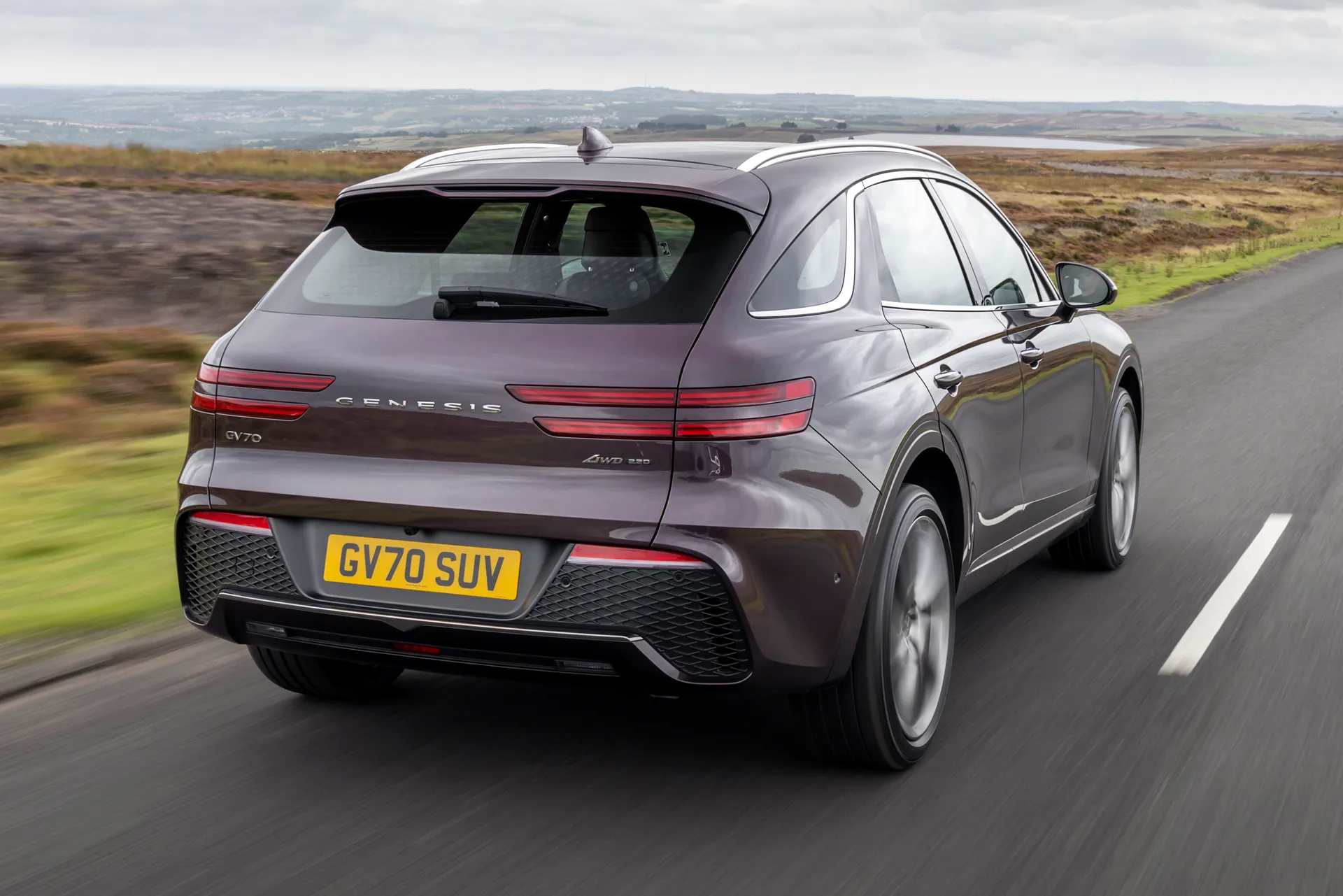
The GV70 was only launched in the UK in 2021, so the prices of used versions haven’t had the chance to come down that much yet. Nevertheless, our listings currently feature a number of fairly young, low-mileage petrol models in Sport trim, and these are coming in at around £34,000.
This represents a saving of around £9,700 compared with a brand-new factory-ordered example, and you won’t have to wait around for the thing to be built and shipped to you.
Prices for brand new versions currently start at around £43,700 for the Premium model equipped with the petrol engine. The diesel costs £3,700 more. With the petrol option ticked, adding the Luxury trim adds £3,600. Upgrading to the range-topper adds £5,700.
Compare those version-for-version prices with those of the equivalent Audi Q5 or BMW X3, and the Genesis is thousands cheaper while providing much more standard equipment and usually significantly more power, too.
Trim levels and standard equipment
Premium, Sport and Luxury trim levels are offered in the Genesis GV70 lineup. All are lavishly equipped with an array of luxury toys. Even entry-level Premium trim includes LED lighting front and rear, automatic headlights with automatic high beam, heated door mirrors that adjust and fold electrically, a leather steering wheel, man-made leather upholstery, keyless entry and go, rear parking sensors, a reversing camera, rain-sensing wipers, dual-zone climate control, a powered tailgate and 19-inch wheels alloy wheels.
Sport and Luxury don’t add a whole lot to the roster of equipment, but in fairness, they don’t add a whole heap to the car’s price, either. Over and above Premium trim, both get heated front seats, a leatherette dashboard trim with aluminium garnish, ambient lighting, and three-zone climate control. Sport models embellish this with some racy styling touches inside and out, part-leather upholstery and a different design of 19-inch alloys, while Luxury trim swaps all that for 21-inch rims and full leather upholstery.
Colour choice depends on what trim is chosen. Premium buyers can choose from four, Luxury and Sport have six.
Optional extras for all models include a panoramic sunroof and the expensive Innovation Pack we’ve already referenced. The optional sunroof is only available in Luxury trim. Similarly, there's a Comfort Seat Pack, which adds a host of cosseting comfort options.
Ask the heycar experts: common questions
Is the Genesis GV70 a good car?
How much is a Genesis GV70?
Is the Genesis GV70 an SUV?
Get our latest advice, news and offers
Keep me updated by email with the latest advice, news and offers from heycar.
By submitting you agree to our privacy policy
